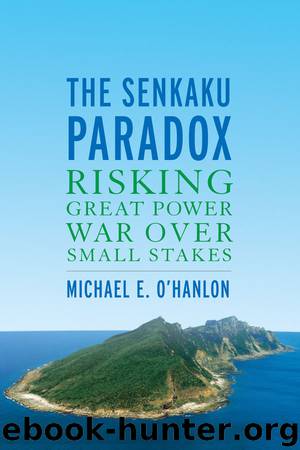The Senkaku Paradox by Michael E

Author:Michael E [Michael E]
Language: eng
Format: epub
Some Recent Cases
Sanctions have been employed as an instrument of statecraft for years. Gary Hufbauer, Jeffrey Schott, and Kimberly Elliott considered more than 100 examples from just the twentieth century in their landmark 1990 study. Overall, they assessed that sanctions had worked reasonably well about one-third of the time. Successful sanctions needed nearly three years on average to achieve their main aims and tended to affect the GDP of the targeted state by more than 2 percent. They were typically easiest to apply and most successful when the targeted state’s economy was smaller than that of the countries applying the sanctions—a sobering reminder when thinking about China in particular.⁷⁹
As Juan Zarate notes in his important work, Treasury’s War, sanctions became controversial in many ways in the 1990s when applied against such targets as Cuba, China, Iraq, Iran, Libya, and Serbia.⁸⁰ He cites earlier work by Meghan O’Sullivan, who argued that many past efforts failed to apply “shrewd sanctions” that were realistic in goals, time horizons, and broader policy context.⁸¹ Since then the international community has gradually improved the precision and effectiveness with which it applies sanctions. Several of the most important recent cases—Iraq in the later 1990s until the 2003 invasion, North Korea over the years (beginning before 1990 and continuing through the present), Iran especially since the 1990s, and Russia especially since 2014—support this view.
After Saddam Hussein invaded Kuwait in 1990, the international community placed sweeping sanctions on Iraq that were in effect designed to bring down the economy unless Iraq reversed course and withdrew its occupying forces. All imports from Iraq, investments in Iraq, and loans to Iraq (except those for narrowly construed humanitarian purposes) were banned, as were any sales of military goods to the country. Even after the cease-fire that followed Operation Desert Storm the following year, the sanctions regime was kept in place. Over time, however, a relief valve was created for the good of the Iraqi population in the form of the oil-for-food program. It allowed escrowed earnings from Iraqi oil exports to be used to pay for food imports.⁸² (Similar types of escrows, or targeted exemptions, could be employed to ensure a country also had access to key medical equipment and medicines, for example.⁸³)
As for North Korea, long-standing U.S. sanctions essentially prohibit trade with, investment in, and the provision of aid to North Korea. They involve the United States and American citizens and businesses, as well as international organizations in which the United States participates. These U.S. sanctions are codified in numerous laws from the 1940s, 1950s, 1960s, and 1970s (such as the Foreign Assistance Act of 1961, the Arms Export Control Act of 1976, and the Export Administration Act of 1979), and in more recent legislation, such as the Iran, North Korea, and Syria Nonproliferation Act of 2000.⁸⁴
UN sanctions have intensified in the years since North Korea broke out of the Nuclear Non-Proliferation Treaty in 2003. UN Security Council Resolution 1718 of 2006 banned arms trade of any kind with North Korea and placed requirements on member states to inspect cargo that might violate this prohibition.
Download
This site does not store any files on its server. We only index and link to content provided by other sites. Please contact the content providers to delete copyright contents if any and email us, we'll remove relevant links or contents immediately.
| Arms Control | Diplomacy |
| Security | Trades & Tariffs |
| Treaties | African |
| Asian | Australian & Oceanian |
| Canadian | Caribbean & Latin American |
| European | Middle Eastern |
| Russian & Former Soviet Union |
The Secret History by Donna Tartt(18998)
The Social Justice Warrior Handbook by Lisa De Pasquale(12177)
Thirteen Reasons Why by Jay Asher(8874)
This Is How You Lose Her by Junot Diaz(6856)
Weapons of Math Destruction by Cathy O'Neil(6248)
Zero to One by Peter Thiel(5765)
Beartown by Fredrik Backman(5717)
The Myth of the Strong Leader by Archie Brown(5481)
The Fire Next Time by James Baldwin(5409)
How Democracies Die by Steven Levitsky & Daniel Ziblatt(5200)
Promise Me, Dad by Joe Biden(5130)
Stone's Rules by Roger Stone(5065)
A Higher Loyalty: Truth, Lies, and Leadership by James Comey(4937)
100 Deadly Skills by Clint Emerson(4899)
Rise and Kill First by Ronen Bergman(4758)
Secrecy World by Jake Bernstein(4727)
The David Icke Guide to the Global Conspiracy (and how to end it) by David Icke(4684)
The Farm by Tom Rob Smith(4486)
The Doomsday Machine by Daniel Ellsberg(4473)
